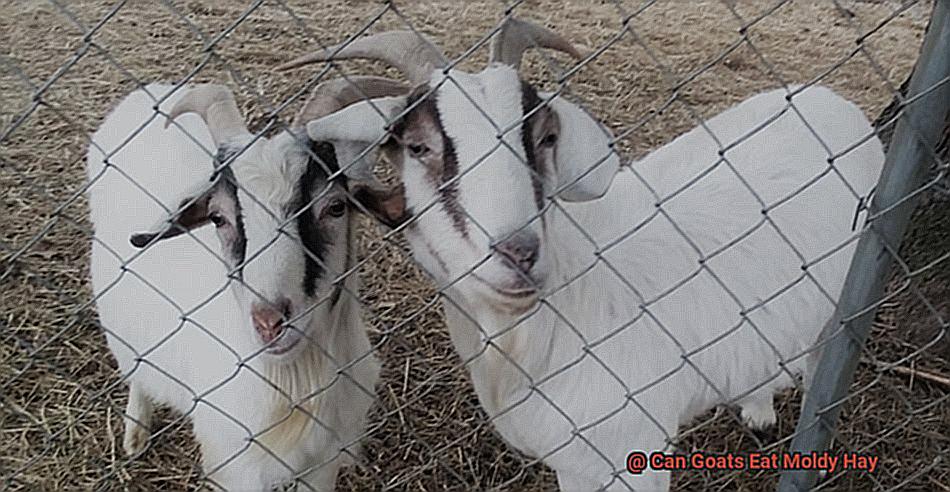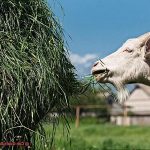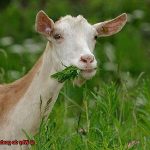As a goat owner, you want to ensure that your beloved animals receive the best nutrition possible. However, with all the myths and misconceptions surrounding goats’ diets, it can be challenging to know what’s safe to feed them. One common question is whether moldy hay is a viable option for goats.
Moldy hay is an issue that plagues many areas worldwide, particularly in humid and wet climates. Not only is it unappetizing, but it can also put your goats’ health at risk. Despite their reputation for eating nearly anything in sight, it’s essential to consider whether moldy hay is safe for these curious creatures.
In this blog post, we’ll delve into the topic of whether goats can safely consume moldy hay or if it poses a threat to their well-being. We’ll explore the symptoms of mold toxicity in goats, how moldy hay can impact their digestive system, and ways to prevent your hay from becoming contaminated with molds.
So, let’s get started.
Understanding the Dangers of Moldy Hay for Goats
Contents
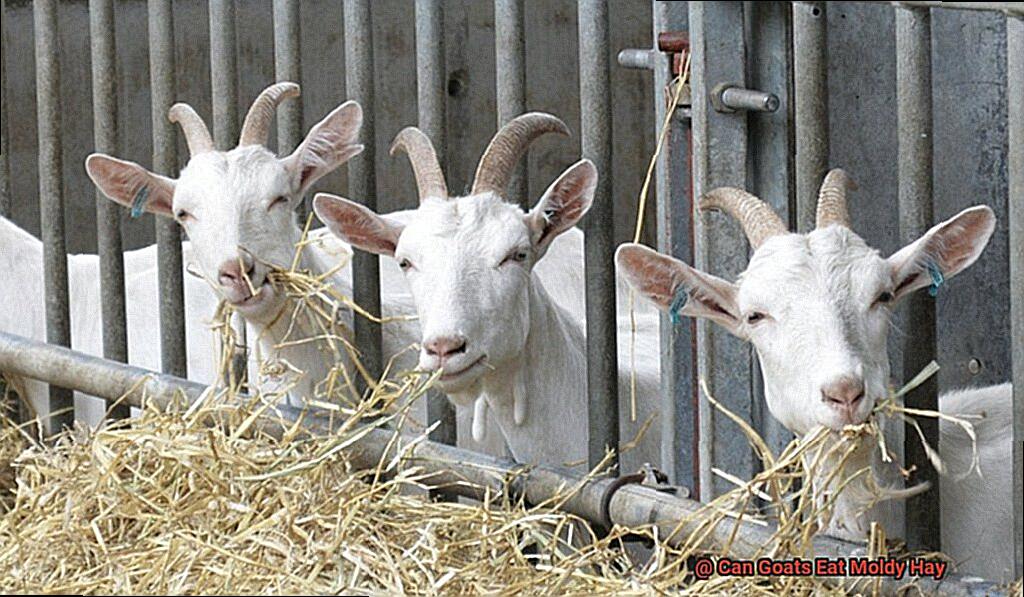
However, one thing that can be dangerous for goats is moldy hay. This seemingly harmless food source can cause a range of health problems for goats, from respiratory issues to liver failure. As an expert on this topic, let me help you understand the dangers of moldy hay for goats and how to keep your animals healthy.
Moldy hay is a result of poor storage conditions and dampness. It can contain different types of mold, some of which are toxic to goats. When goats ingest moldy hay, they can suffer from respiratory issues, such as coughing and wheezing. In some cases, mold exposure can even lead to chronic respiratory diseases that persist long after the goat has stopped consuming moldy hay.
In addition to respiratory issues, moldy hay can also cause digestive problems for goats. Mycotoxins present in moldy hay can interfere with the proper functioning of the digestive system, leading to diarrhea, bloating, and other gastrointestinal symptoms. In severe cases, ingestion of moldy hay can even cause liver damage or failure.
To prevent your goats from consuming moldy hay, proper storage and handling are crucial. Make sure your hay is dry, well-ventilated, and free from moisture by storing it in a dry area. Avoid storing hay in damp areas or areas with high humidity levels as moisture encourages mold growth. Inspect your hay carefully before feeding it to your goats and discard any that appear moldy or smell musty.
It is important to take these precautions because moldy hay can cause severe health problems for your goats and even lead to death in severe cases. As a responsible goat owner, you want to provide your animals with the best possible care. By storing hay properly and inspecting it regularly, you can help ensure the health and wellbeing of your goats.
While goats may eat almost anything, it is important to avoid moldy hay at all costs. Eating moldy hay can cause severe health problems and even death for your goats. Remember, prevention is key when it comes to protecting your animals from the dangers of moldy hay.
How to Identify Moldy Hay
One of the best ways to do that is by providing them with fresh, mold-free hay. Moldy hay can cause serious health problems for goats, so it’s important to know how to identify it and prevent its growth. Here are five simple steps to follow:
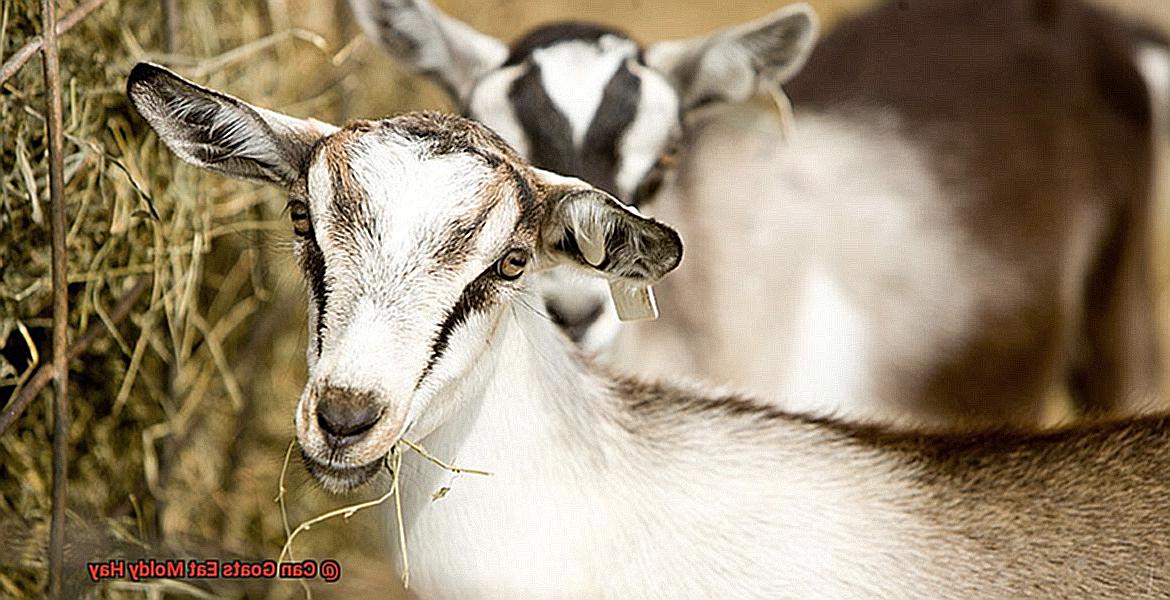
Step 1: Use Your Senses
The first step in identifying moldy hay is to use your senses. Look for hay that has a musty or moldy smell, and appears discolored, yellow or brown instead of the bright green color of fresh hay. Visible mold growth on the surface is another clear sign of moldy hay.
Step 2: Feel the Texture
In addition to using your sense of sight, feel the texture of the hay. Moldy hay may feel slimy or sticky, indicating the presence of mold spores. It may also feel excessively dry or dusty, which can be a sign of old or improperly stored hay.
Step 3: Be Aware of Conditions That Promote Mold Growth
Hay that has been stored in damp or humid conditions is more likely to develop mold than dry hay stored in a cool, dry place. Baling hay too wet can also promote mold growth.
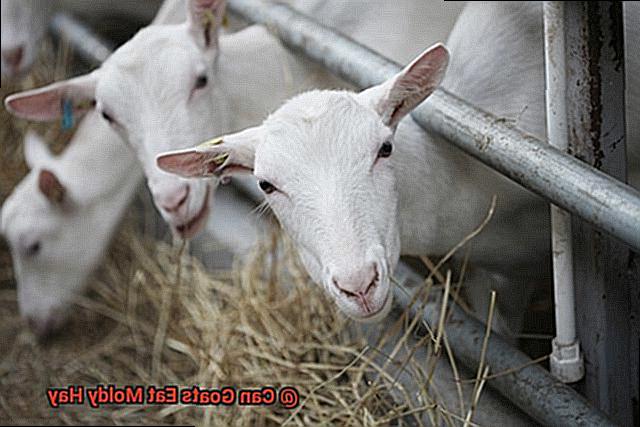
Step 4: Properly Store Your Hay
To prevent mold from developing in your hay, store it properly in a dry, well-ventilated area. This can include a barn, shed, or other covered structure that allows air to circulate freely. Additionally, keep your hay off the ground and away from moisture sources such as leaky roofs or walls.
Step 5: Regularly Inspect Your Hay
Regularly inspecting your hay for signs of mold growth is important in preventing any potential health issues for your goats. Always inspect your hay carefully before feeding it to your goats and discard any that appears moldy or otherwise contaminated.
Health Problems Associated with Eating Moldy Hay
And one crucial aspect of their care is ensuring they have access to high-quality hay that’s free of mold. Why is this so important? Well, there are several health problems associated with eating moldy hay that you definitely want to avoid.
First and foremost is mycotoxin poisoning. This occurs when goats consume hay contaminated with toxic substances produced by certain types of fungi. These toxins can cause a range of symptoms, from digestive upset to weight loss, lethargy, and even death. Clearly, this is not something you want your precious goats to experience.
But that’s not all. Goats that eat moldy hay may also develop respiratory problems. This happens when mold spores are released into the air, which goats then inhale. This can lead to respiratory distress, coughing, and other breathing difficulties. Not ideal for animals known for their curious and playful nature.
And if you thought it couldn’t get any worse, there’s also a potential risk of botulism. This rare but serious condition is caused by the Clostridium botulinum bacteria, which can grow on moldy hay. Goats that consume this bacteria may experience paralysis, respiratory failure, and even death.
So, what can you do to prevent these health problems from affecting your goats? Start by being vigilant about the quality of hay you provide. Choose high-quality, mold-free hay and store it properly in a dry and well-ventilated area. Regularly inspect your hay before feeding it to your goats and use your senses to identify any signs of mold. A little effort in this regard can go a long way in ensuring the long-term health and well-being of your goats.
Mycotoxicosis: The Serious Effects of Eating Moldy Hay
However, feeding your goats moldy hay can lead to mycotoxicosis, a serious condition caused by the toxins produced by molds that grow on hay. Don’t put your goats’ health at risk- learn how to prevent mycotoxicosis and keep your goats happy and healthy.
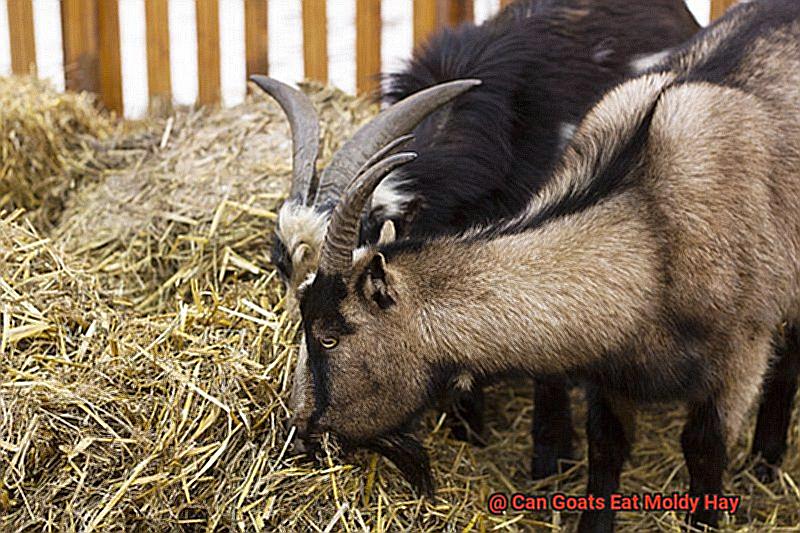
The symptoms of mycotoxicosis can range from mild to severe, depending on the type of mycotoxin ingested and the severity of exposure. Common signs include loss of appetite, weight loss, diarrhea, and decreased milk production. In severe cases, mycotoxicosis can cause liver damage, neurological problems, and even death.
To keep your goats safe from mycotoxicosis, make sure to store your hay properly in a dry, well-ventilated area to prevent mold growth. Always inspect your hay before feeding it to your goats to ensure it’s free from mold and other contaminants. If you discover moldy hay, remove it immediately and replace it with fresh hay.
It’s also vital to monitor your goats closely for any signs of mycotoxicosis if they have been exposed to moldy hay. By catching the symptoms early on, you can take action to prevent further health problems.
In conclusion, preventing mycotoxicosis in goats is crucial for their health and happiness. Proper hay storage and feeding practices are the keys to keeping your goats safe from this serious condition. By staying vigilant and taking action when needed, you can ensure your goats’ continued well-being.
How to Prevent Goats from Eating Moldy Hay
Not all hay is created equal. Moldy hay can be harmful to your goats and lead to various health problems, including respiratory issues, diarrhea, and even death in severe cases.
So, how can you prevent your goats from eating moldy hay? Here are five essential steps to ensure your goats’ health and well-being.
Inspect Your Hay
Before feeding hay to your goats, inspect it thoroughly. Look for any signs of mold or dampness, such as a musty odor or visible mold growth. Discard any hay that appears moldy or damp right away.
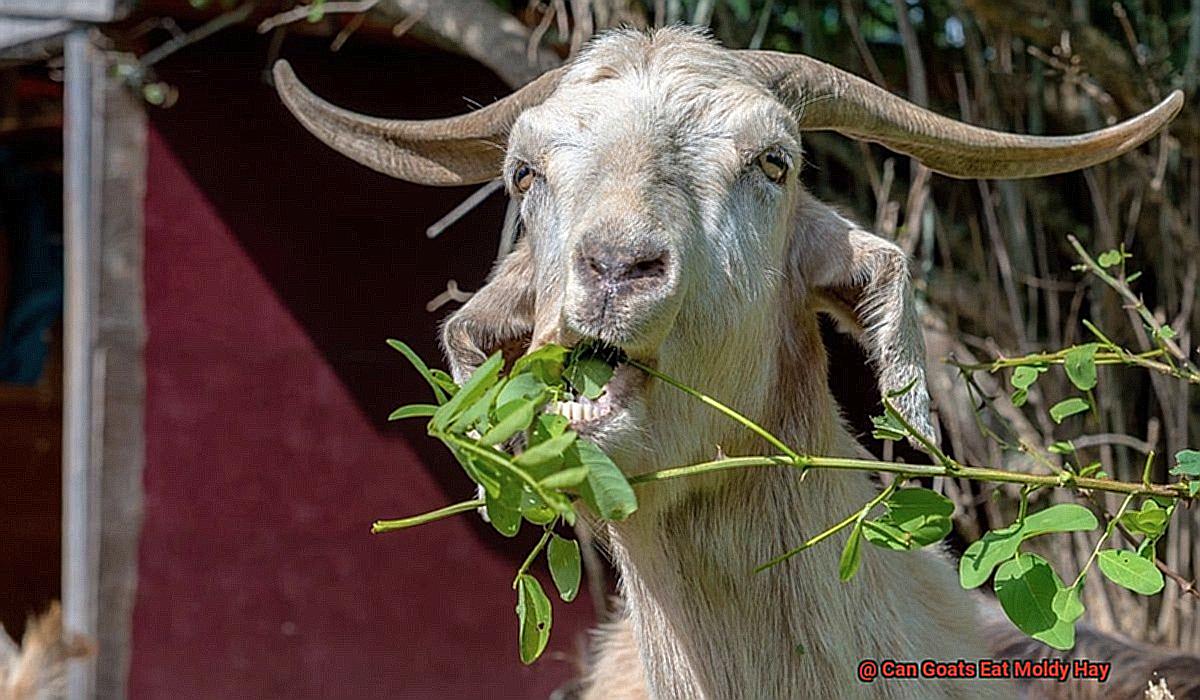
Remember, prevention is key when it comes to your goat’s health.
Store Your Hay Properly
Proper storage is crucial to prevent mold growth on hay. Make sure to store your hay in a dry and well-ventilated area that’s protected from rain and snow.
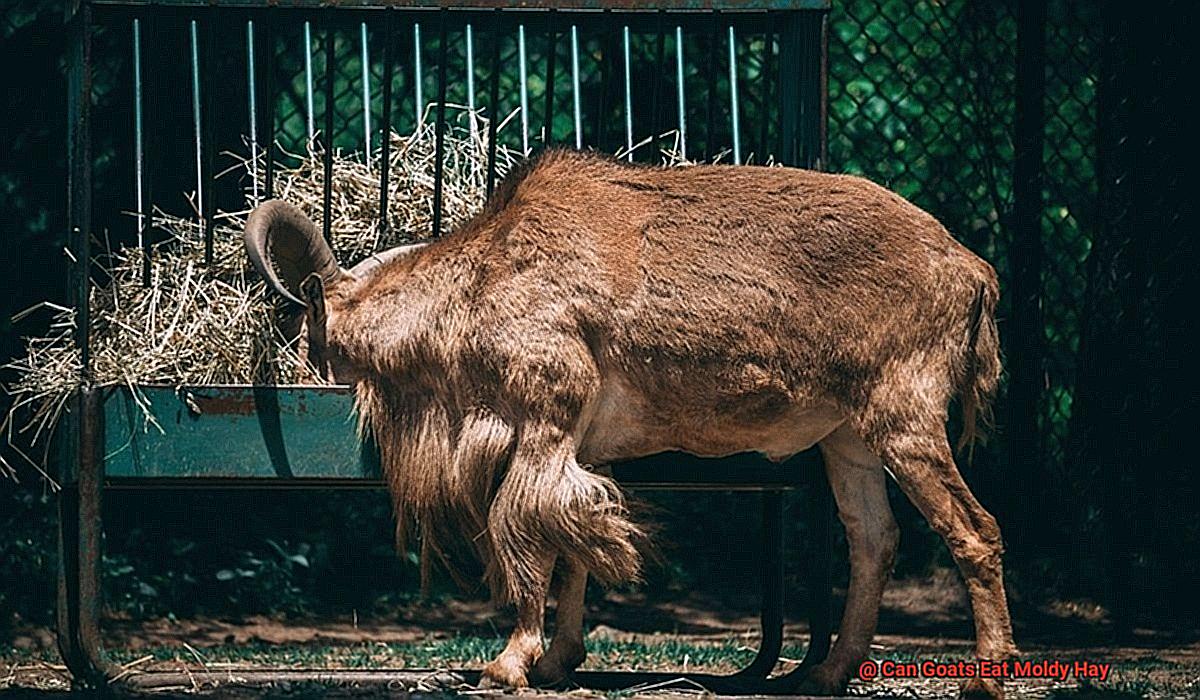
If possible, store the hay off the ground on pallets or shelves to allow air circulation around the hay and prevent moisture accumulation.
Use Feeding Devices
Using hay nets or racks can help keep the hay off the ground and away from moisture and mold. Feeding goats in a clean and dry feeding area can also help reduce the risk of mold contamination.
Provide Fresh Pasture Access
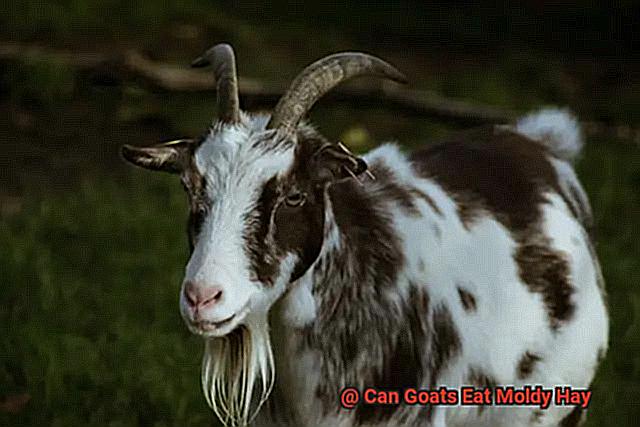
Providing your goats with access to fresh pasture can help reduce their dependence on hay and decrease the risk of them consuming moldy hay. During the summer months, when pasture is abundant, make sure to give your goats plenty of grazing opportunities.
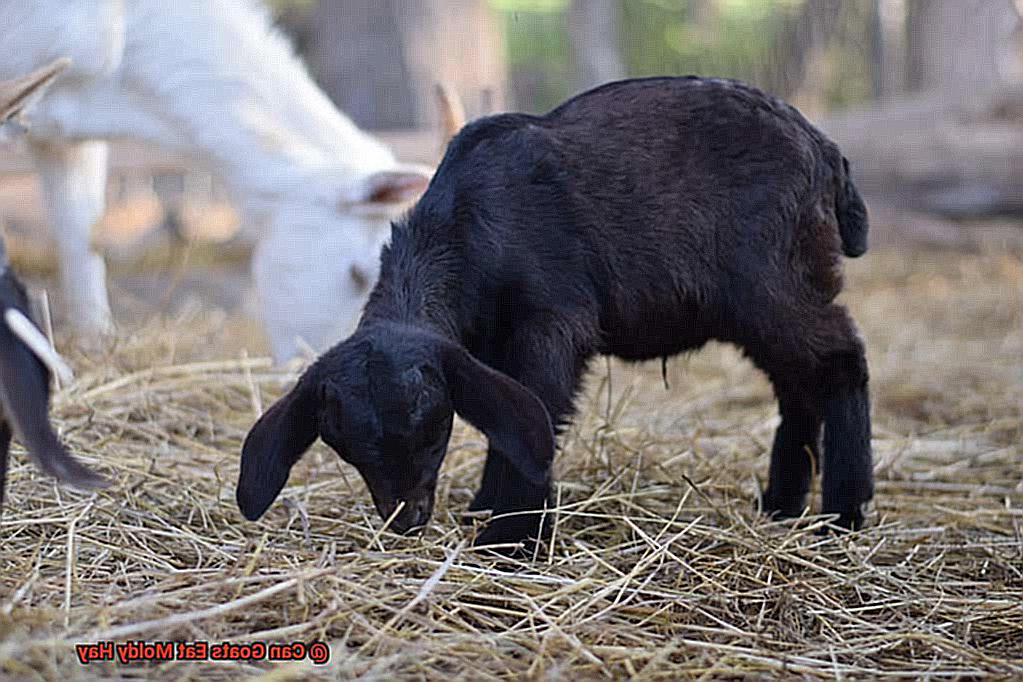
Monitor Your Goats’ Health
Keep a close eye on your goats’ health, especially after feeding them hay. If a goat shows any signs of illness after consuming hay, such as coughing, nasal discharge, or diarrhea, it is essential to seek veterinary care immediately.
Preventing your goats from eating moldy hay requires careful attention and proper management practices. By ensuring high-quality hay, proper storage, feeding devices, fresh pasture access, and monitoring your goat’s health closely, you can minimize the risk of mold contamination and ensure your goat’s health and well-being.
The Benefits of Properly Stored, Non-Moldy Hay
When it comes to livestock animals like goats, the benefits of feeding them with high-quality hay are numerous and can have a significant impact on their overall health and well-being.
One of the most crucial benefits of feeding goats with non-moldy hay is that it ensures that the hay is free from harmful toxins and molds. Moldy hay can contain mycotoxins that can lead to respiratory issues, neurological problems, and even death in severe cases. Therefore, it’s critical to inspect your hay thoroughly and store it correctly to prevent mold growth.
Another essential benefit of storing hay correctly is that it retains its nutritional value. When hay is exposed to moisture, sunlight, and air, it can degrade over time, losing its valuable nutrients. Feeding degraded hay to your goats may not provide them with the necessary nutrients required for their growth and development.
Moreover, feeding goats with properly stored and non-moldy hay reduces the risk of respiratory issues. Moldy hay can release harmful spores into the air, which can cause respiratory problems in goats. This can result in coughing, sneezing, and other respiratory issues that can lead to more severe health problems if left untreated.
Therefore, as a goat owner or farmer, it’s vital to provide your animals with high-quality hay that is free from mold and stored correctly.
By doing so, you’ll be ensuring their health and well-being while also preventing potential health problems caused by moldy hay.
Feeding your goats with properly stored and non-moldy hay is one way to provide them with the best care possible. By providing them with high-quality hay, you’ll be ensuring their health and well-being while also preventing potential health problems caused by moldy hay.
Forage Alternatives for Goats Who Can’t Eat Moldy Hay
There are many forage alternatives available to keep your goats in tip-top shape.
One of the most straightforward solutions is to offer your goats fresh hay or pasture. Keep an eye on the condition of the hay, ensuring it is stored in a dry, well-ventilated area. Pasture can be an excellent source of nutrition for goats, as long as it’s appropriately managed and free from toxic plants.
Another alternative is to supplement your goat’s diet with haylage or silage. Haylage and silage are preserved forages made by fermenting fresh grass or other crops. Unlike traditional hay, they are less prone to mold growth and can provide a nutritious source of food for your goats.
In addition to haylage and silage, you can also consider feeding your goats alfalfa, clover, timothy, or orchard grass. These forage crops can be harvested and stored in a way that minimizes mold growth; therefore, they are safe and nutritious alternatives to moldy hay.
Lastly, some goat owners opt for commercial goat feed or supplements.
However, choose a high-quality product that is free from mold and other contaminants to ensure your goats stay healthy.
OW0f2Xf4yJE” >
Conclusion
You want to ensure that your furry friends receive the best nutrition possible. One question that often arises is whether moldy hay is safe for goats to eat. Unfortunately, moldy hay can put your goats’ health at risk and cause various health problems, from respiratory issues to liver failure.
To prevent your goats from consuming moldy hay, proper storage and handling are crucial. It’s essential to store hay in a dry area that is well-ventilated and free from moisture. Avoid storing hay in damp areas or areas with high humidity levels as moisture encourages mold growth. Before feeding your goats, inspect the hay carefully and discard any that appear moldy or smell musty.
Moldy hay can interfere with the proper functioning of the digestive system, leading to diarrhea, bloating, and other gastrointestinal symptoms. In severe cases, ingestion of moldy hay can even cause liver damage or failure. Therefore, preventing your goats from eating moldy hay requires careful attention and proper management practices.
By ensuring high-quality hay, proper storage, feeding devices, fresh pasture access, and monitoring your goat’s health closely, you can minimize the risk of mold contamination and ensure their health and wellbeing.
Feeding your goats with properly stored and non-moldy hay is one way to provide them with optimal care while preventing potential health problems caused by moldy hay. There are many alternatives available for goats who cannot eat moldy hay that you can consider offering them for a nutritious source of food year-round.

